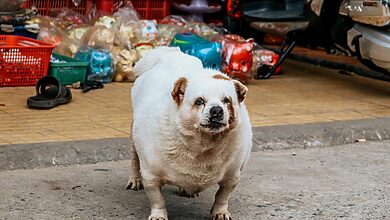Puppy Diarrhea: Your Complete Handbook for Effective Management

Puppy diarrhea can be distressing for both puppies and their owners. While occasional loose stools are common, persistent diarrhea can indicate underlying health issues that require attention. In this comprehensive guide, we will delve into the causes, symptoms, treatment options, and preventive measures for puppy diarrhea, equipping you with the knowledge to effectively manage this common problem and ensure your puppy’s well-being.
Causes of Puppy Diarrhea:
Dietary Indiscretion:
Puppies are notorious for exploring their environment with their mouths, often ingesting items that can upset their delicate digestive systems. This can include scavenging for scraps, eating plants, or consuming inappropriate human foods.
Intestinal Parasites:
Worms such as roundworms, hookworms, whipworms, and giardia are common culprits of diarrhea in puppies. These parasites can cause irritation and inflammation in the intestinal tract, leading to loose stools and other symptoms.
Bacterial or Viral Infections:
Puppies are susceptible to a range of bacterial and viral infections that can cause diarrhea. Parvovirus, coronavirus, salmonella, and campylobacter are some of the pathogens that can wreak havoc on a puppy’s digestive system.
Dietary Intolerance or Allergies:
Some puppies may have sensitivities or allergies to certain ingredients in their food, such as grains, dairy, or specific proteins. These dietary intolerances can trigger gastrointestinal upset, including diarrhea.
Stress or Anxiety:
Changes in a puppy’s environment, routine, or social interactions can induce stress, leading to digestive disturbances like diarrhea. Events such as moving to a new home, being separated from their mother and littermates, or encountering unfamiliar people or animals can all contribute to stress-related diarrhea.
Symptoms of Puppy Diarrhea:
- Loose or Watery Stools: Diarrhea is characterized by loose, liquid stools that may vary in color and consistency.
- Increased Frequency of Bowel Movements: Puppies with diarrhea may need to defecate more frequently than usual, sometimes urgently.
- Straining or Urgency to Defecate: Puppies may exhibit signs of discomfort or urgency when attempting to defecate, including straining or pacing.
- Presence of Blood or Mucus: Blood or mucus may be present in the stool, indicating inflammation or irritation in the gastrointestinal tract.
- Vomiting: Some puppies may vomit in addition to experiencing diarrhea, further exacerbating dehydration and electrolyte imbalances.
- Lethargy or Weakness: Diarrhea can drain a puppy’s energy, leading to lethargy, weakness, and decreased interest in play or activity.
- Loss of Appetite: Puppies with diarrhea may lose their appetite or show reluctance to eat, further compromising their nutritional status and overall well-being.
- Dehydration: Prolonged diarrhea can lead to dehydration, characterized by dry gums, sunken eyes, decreased skin elasticity, and lethargy.
3. Treatment Options:
Veterinary Evaluation:
If your puppy experiences diarrhea, it’s crucial to seek veterinary attention promptly. A veterinarian can perform a thorough physical examination, assess your puppy’s medical history, and recommend appropriate diagnostic tests to identify the underlying cause of the diarrhea.
Fluid Therapy:
Dehydration is a significant concern with diarrhea, especially in young puppies. Your veterinarian may administer fluids intravenously or subcutaneously to restore hydration and electrolyte balance.
Dietary Management:
In many cases, switching to a bland diet can help soothe your puppy’s irritated digestive tract and promote normal stool consistency. A bland diet typically consists of easily digestible foods such as boiled chicken or turkey and white rice or pasta. Gradually reintroduce your puppy’s regular diet once their stools have normalized.
Medications:
Depending on the underlying cause of the diarrhea, your veterinarian may prescribe medications such as antibiotics, anti-diarrheal drugs, or anti-parasitic medications to address bacterial infections, inflammation, or parasite infestations.
Probiotics:
Probiotics are beneficial bacteria that can help restore balance to the intestinal microbiota and promote gastrointestinal health. Your veterinarian may recommend probiotic supplements or specially formulated diets containing probiotics to support your puppy’s recovery from diarrhea.
Deworming:
If intestinal parasites are suspected or identified as the cause of the diarrhea, deworming medications may be necessary to eliminate the parasites and prevent recurrence of the infection.
Preventive Measures:
Proper Nutrition:
Feed your puppy a balanced diet that meets their nutritional needs based on their age, breed, size, and activity level. Choose high-quality commercial puppy food or consult with your veterinarian for guidance on homemade diets.
Gradual Diet Changes:
Avoid sudden changes in your puppy’s diet, as this can disrupt their digestive system and trigger diarrhea. When transitioning to a new food, do so gradually over the course of several days to allow your puppy’s gastrointestinal tract to adjust.
Regular Deworming:
Follow your veterinarian’s recommendations for deworming to prevent and control intestinal parasite infestations in your puppy. Puppies are often dewormed as part of their routine vaccination schedule, but additional deworming may be necessary depending on their risk of exposure to parasites.
Vaccinations:
Ensure your puppy is up-to-date on vaccinations to protect them against common viral infections such as parvovirus, which can cause severe diarrhea and other life-threatening symptoms. Vaccination schedules may vary depending on your puppy’s age, health status, and lifestyle factors.
Stress Management:
Minimize stressors in your puppy’s environment and provide plenty of opportunities for socialization, mental stimulation, and positive reinforcement training. Creating a safe, predictable, and nurturing environment can help reduce your puppy’s susceptibility to stress-related diarrhea.
Hygiene:
Practice good hygiene by keeping your puppy’s living area clean and sanitary, including their food and water bowls, bedding, and toys. Regularly clean and disinfect their living space to minimize the risk of bacterial or viral contamination.
Regular Veterinary Checkups:
Schedule regular wellness exams with your veterinarian to monitor your puppy’s health and detect any potential issues early on. Veterinary professionals can provide guidance on preventive care, nutrition, behavior, and overall wellness to help keep your puppy happy and healthy.
10 Best Medicines for Puppy Diarrhea in the USA:
- Pedialyte: Pedialyte is an electrolyte solution that helps replenish fluids and electrolytes lost due to diarrhea and dehydration in puppies.
- Pro-Pectalin Anti-Diarrheal Gel: This gel contains kaolin, pectin, and Enterococcus faecium, which help soothe the intestinal lining and restore normal stool consistency in puppies.
- Metronidazole (Flagyl): Metronidazole is an antibiotic that can be prescribed by veterinarians to treat bacterial infections and inflammatory bowel disease, which may cause diarrhea in puppies.
- Bland Diet: Feeding your puppy a bland diet consisting of boiled chicken or turkey and white rice can help alleviate diarrhea and provide easy-to-digest nutrition.
- Probiotics: Probiotic supplements containing beneficial bacteria like Lactobacillus and Bifidobacterium can help restore balance to the gut microbiota and promote healthy digestion in puppies.
- Pumpkin: Canned pumpkin (not pumpkin pie filling) is rich in fiber and can help firm up loose stools in puppies with diarrhea.
- Digestive Enzymes: Digestive enzyme supplements can aid in the breakdown and absorption of nutrients, supporting digestive health in puppies with diarrhea.
- Kaolin and Pectin Products: Kaolin and pectin-based products like Kaopectate can help absorb excess fluid in the intestines and reduce diarrhea in puppies.
- Fiber Supplements: Fiber supplements such as psyllium husk or powdered cellulose can add bulk to stools and regulate bowel movements in puppies with diarrhea.
- Prescription Medications: In severe cases of puppy diarrhea, your veterinarian may prescribe prescription medications such as antibiotics, anti-inflammatory drugs, or anti-parasitic medications to address the underlying cause and alleviate symptoms.
Puppy Diarrhea
Puppy diarrhea is a common problem that can have various causes, ranging from dietary indiscretion and intestinal parasites to viral infections and stress. While occasional loose stools are normal, persistent or severe diarrhea requires prompt veterinary attention to identify and address the underlying cause. By understanding the causes, recognizing the symptoms, seeking appropriate treatment, and implementing preventive measures, you can help ensure your puppy’s digestive health and overall well-being.
FAQs:
Q.What causes diarrhea in puppies?
- Diarrhea in puppies can be caused by various factors, including dietary indiscretion, intestinal parasites, viral or bacterial infections, dietary allergies or intolerances, stress, and underlying medical conditions.
Q. When should I be concerned about my puppy’s diarrhea?
- You should be concerned if your puppy’s diarrhea is severe, persistent, accompanied by other symptoms such as vomiting, lethargy, or blood in the stool, or if your puppy is very young or immunocompromised.
Q. Can I give my puppy over-the-counter medications for diarrhea?
- It’s best to consult with your veterinarian before giving your puppy any over-the-counter medications for diarrhea, as some medications may be harmful or inappropriate for puppies.
Q. How should I treat my puppy’s diarrhea at home?
- Treatment for puppy diarrhea at home may include feeding a bland diet, providing plenty of fresh water to prevent dehydration, and administering probiotics or other supplements recommended by your veterinarian.
Q. When should I contact my veterinarian about my puppy’s diarrhea?
- You should contact your veterinarian if your puppy’s diarrhea persists for more than 24 hours, is accompanied by other concerning symptoms, or if your puppy is very young, elderly, or has pre-existing health conditions. Your veterinarian can provide guidance on appropriate treatment and management strategies for your puppy’s diarrhea.
If you have any concerns about your puppy’s health or diarrhea, don’t hesitate to contact your veterinarian for guidance and support.







